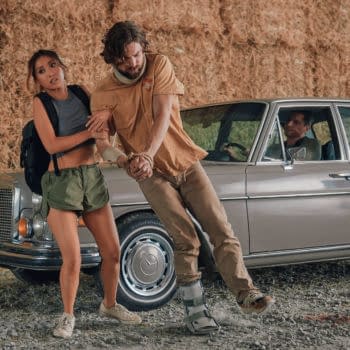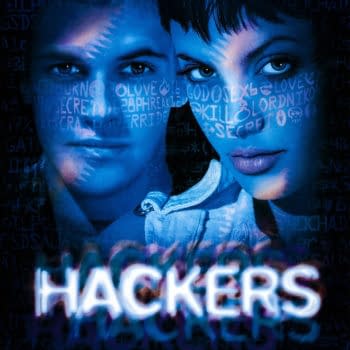Posted in: Movies, Recent Updates, Video Games | Tagged: Doug Davidson, entertainment, Fantasy Grounds, video games, Virtual Table Top Gaming
Explore Virtual Table Top Gaming In Fantasy Grounds – Talking With Doug Davidson
By Christopher Helton
With the increase of the ubiquity of the internet and the prices for internet connections with decent up and download speeds getting cheaper, technology is making it easier and easier for tabletop gamers to be able to game without the physical tabletop. One of the important advances for gaming over the last few years has been the development of the online, virtual tabletop.
With a virtual tabletop, people in different parts of the country, or even the world, can play together in games that require maps and miniatures as if they are all physically at the same place. For some, the online experience just isn't as fulfilling but more and more people take to using an online component to their tabletop games every day. One of the popular virtual tabletops is Fantasy Grounds. I spoke with Doug Davidson of about Fantasy Grounds and virtual tabletops.
Christopher Helton: Thank you for joining me for this interview today. First off, since a lot of people at this site may not know, what exactly is a Virtual Table Top (VTT)?
Doug Davidson: Thanks for the invitation and opportunity to share a little about Fantasy Grounds.
To explain a virtual tabletop (VTT), it is basically a software solution which allows players and GMs to experience and participate in a roleplaying game much like they would do in an in-person setting, but on the computer. Some of the VTT solutions are web sites, while others are programs installed to run on each person's computer. Some support local play and others support play with some or all players located remotely.
Each VTT brings a different set of functionality for use in the game.
CH: What does a Virtual Table Top bring to the "table" for those gaming long distance, or via the internet?
DD: Fantasy Grounds (often abbreviated as FG) attempts to be as full featured as possible and provides dice rolling functionality with very realistic dice rolling physics supported, dice buckets and macros that show all the bonuses and negatives applying to the roll along with the totals and even success or failure in many of the rulesets supported by FG. In addition to that, it has text-based chat capabilities you would typically find in an MMO, image and map sharing with the ability to move around tokens representing your character and NPCs, a combat initiative tracker, pre-placement of monster starting locations on maps, campaign management and GM preparation functionality, lots of automation and intelligent character sheets specific to each game supported.
As an example of automation present in the system, the GM can hover over a monster's attack to pick up the attack dice rolls (perhaps 2 claws and a bite) and then drop those dice onto the token for a player to have it automatically apply the various bonuses, confirm a hit or miss against the player's defenses and report it to all connected players in the chat window. Damage dice could then be picked up and delivered to the player in the same fashion.
The nice thing about automation is that you can use as much or as little of it as you want or are comfortable with. We think that once people see how quickly the automation allows them to play, however, they will really start to wonder what they did before it. Combats and interactions between GM and players can end up running significantly faster than in person when users start to take full advantage it.
Here is an example of a game where the players are using lots of chat for in character discussions. Most players and GM's will use a combination of voice and chat, but it provides a nice running log of everything which has occurred during the session.
CH: What lead to the development of Fantasy Grounds?
DD: FG was originally written in 2004 by Tero Parvinen, Ville Renvall and Ville Leino (three guys in Finland). They basically wrote it to satisfy their own needs and as a hobby, fun thing to do. I bought the company from SmiteWorks Ltd in 2009 and then John Gregory joined the company shortly afterward. He and I had both come to the software as users and quickly saw how powerful and flexible the system was. I wrote a Star Wars Saga Edition Ruleset for my own personal use and John wrote an enhanced D&D 3.5 ruleset and then a D&D 4E ruleset afterwards. We were both active on the forums and on a whim I reached out to John to see if he'd be interested in making a pitch to acquire the company.
Smiteworks had been successful before we acquired the company, but it seemed like it need a new infusion of life and energy. We also wanted to capitalize on the amazing flexibility and expand the software to support as many different game systems as possible. When we took over the company in 2009, there were roughly a few dozen or so add-ons provided mostly by a third party developer. We took these in-house and as of today, we have 267 official add-ons for the product which comprise everything from new game systems, pre-loaded ready to run adventures, splat books, token packs and map packs.
CH: How has the development of Virtual Table Tops changed online game playing?
DD: I'm still surprised to see that people continue to play online without the support of a VTT. You can play with a light-weight VTT or even completely for free with Google Hangouts, but I don't think either of those experiences comes close to an in-person game. If you host or play in a few games using Fantasy Grounds, I think you will be pleasantly surprised at how fun it is and how well it captures the full experience.
CH: What are the strengths of Fantasy Grounds as a Virtual Table Top?
DD: I've mentioned some of these previously, but I'd have to say it is the complete-ness of the experience. Almost every VTT will support map and image sharing, but the Interactive Character Sheets, rollable dice and game system specific automation are the key points that set FG apart. We are often told that it is a "pretty" system as well. Aesthetics are important to the experience as well, so when you are playing Mutants & Masterminds, you'll see that it looks and feels different than Savage Worlds. Deadlands looks and feels different than D&D or Pathfinder.
CH: What are some of the pitfalls that those who may not have used a Virtual Table Top can face when trying one for the first time?
DD: It is software and so it can suffer from some of the same things other software programs suffer from. You'll have to install it, plan on spending some time experimenting around with it or watching some YouTube videos to see how to effectively use it and how you can connect with other players. Most Players can connect to an experienced GM and get up and running in very short order. GM's need a little more time planned in advance. You can absolutely wing it and create everything on the fly, but for new GM's I'd recommend they prep as much as possible until they are real comfortable with the system.
GM's also need to route a port from their router to their PC/laptop in order to let players connect to them. We have a test feature set up on our launch screen and it's a single port (1802) which needs to be routed over. Our community forums are very active and helpful if anyone gets stuck on this point and we have a FAQ. Thankfully, that only needs to be set up once for most people.
CH: What games do you use Fantasy Grounds for? How do the strengths of Fantasy Grounds work in hand with those games?
DD: We have 40 game systems supported either officially or with community created rulesets. You can check them all out here.
That said, I personally play a lot of D&D 3.5, 4E, Pathfinder and Savage Worlds (mostly Deadlands Reloaded.)
CH: What is coming in the future for Fantasy Grounds?
DD: The next big push for us internally is to get everything available on Steam. We've been greenlit and just need to finish rolling out the core products and add-ons there. The goal is for Steam users and non-Steam users to be able to game with each other. I'm excited about the possibility of users running Steam's bigbox and playing RPGs on their living room TV with gamers across the country or world.
Other than that, we plan to support D&D Next out of the gate with a new ruleset. That's pretty important to us.
Christopher Helton is a blogger, podcaster and tabletop RPG publisher who talks about games and other forms of geekery at the long-running Dorkland! blog. He is also the co-publisher at the ENnie Award winning Battlefield Press, Inc. You can find him on Twitter at @dorkland and on G+ at https://plus.google.com/+ChristopherHelton/ where he will talk your ear off about gaming and comics.


















